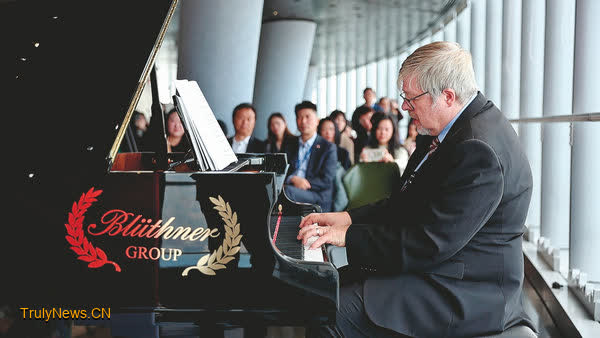
A piano work recently discovered to be composed by Wolfgang Amadeus Mozart (1756-91) was performed for the first time in Asia on Monday.
Eduard Lanner, director of Johann Joseph Fux Conservatory in Graz, Austria, played the
Milan Variations
on the 119th floor of the 632-meter-high Shanghai Tower.
“The Shanghai Tower is the tallest skyscraper in China and we believe the performance of this newly found Mozart piece will take the cultural communications and friendship between China and Austria to a new height,” says Yan Ming, secretary of the Communist Party of China Committee at Shanghai Tower.
Earlier this year, Carsten Wollin, a German scientist, and music historian Paul Duncan from Styria, Austria, announced that the
Milan Variations
, discovered in the Styrian Provincial Archives in Graz, was actually composed by Mozart, instead of some unknown musician, as it was believed to be.
The manuscript is part of the “Lannoy Collection”, named after Heinrich Eduard Josef von Lannoy, a composer who gave his collection first to the Styrian Music Association, and eventually to the archives in 2005, Lanner told China Daily before the show.
For centuries the piece was neglected, until Wollin and Duncan investigated and found watermarks that linked it conclusively to a certain time frame. “These watermarks now prove that this manuscript should be from the year of 1791 — maybe some years before or some years later, but not later than 1799.”
This means it was published by Johann Traeg in Vienna, the longtime publisher and friend of Mozart. Either Mozart himself gave this piece to Traeg personally, or his wife Constanze, we don’t know, Lanner says, “but we think it’s not possible that it’s a fake. Because of the close relationship between Mozart and Traeg, it was impossible for him to publish the variations without the knowledge of Mozart.”

In 1771, Mozart stayed with his father in Milan, when he was asked to write an opera for the wedding of Archduke Ferdinand Karl. The theme of these variations is from the opera
Ascanio in Alba
, which is described as a wedding serenata, Lanner explains.
Earlier this year, a music piece in the collection of the Leipzig Municipal Libraries in Germany was found to be composed by Mozart too. The 12-minute string trio, now referred to as
Ganz kleine Nachtmusik
, was performed in Salzburg in September.
It is well-known that the “Lannoy Collection” has many treasures, Lanner told China Daily. It was the curiosity of Wollin and Duncan that prompted them to “try again, have a look again” that led to the discovery. Since “scientists are always curious”, Lanner says, it’s very possible that more discoveries like this could be made in the future.
Lanner made the first performance of the
Milan Variations
since the 18th century on Oct 16 in Graz. On Nov 6, he performed the piece in Tartu (Estonia), the European Capital of Culture 2024, and on Nov 7 in the Estonian capital, Tallinn.
Shanghai is “a very important cultural city, maybe the most important city here in China and in Asia”, Lanner explains the decision to make the performance in Shanghai. “It is a perfect place for classical music.
“You find the perfect audience here: many music lovers, many people who are interested in culture and classical music. You find many publishing houses, and also many people dealing with music. And so I think it is a perfect market for this.”
The first publication of
Milan Variations
was recently brought out by the German print media Ortus Musikverlag.